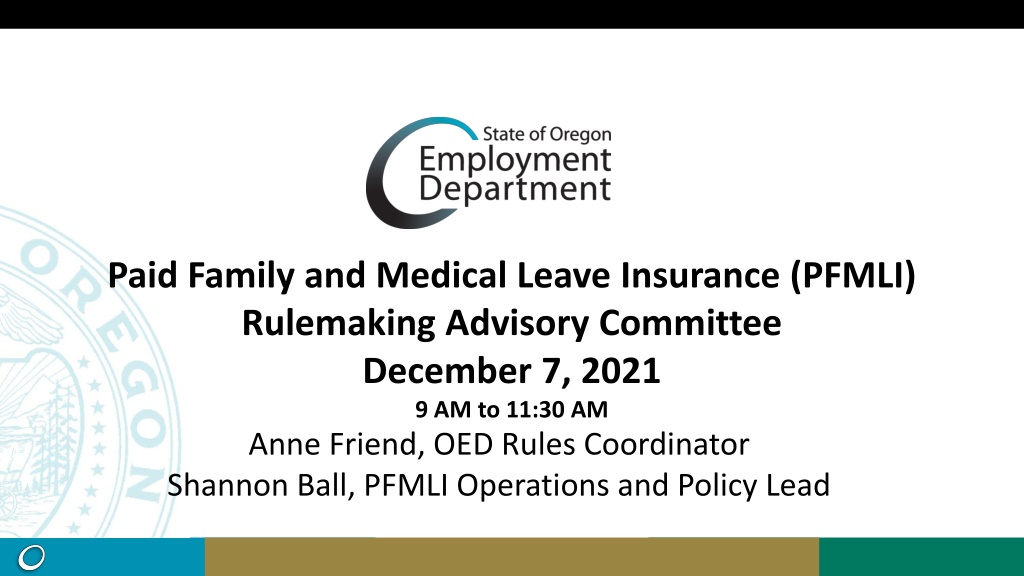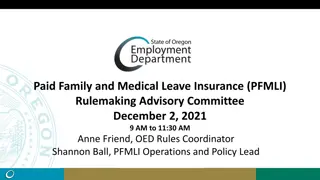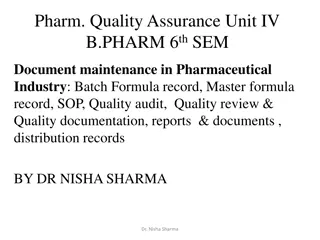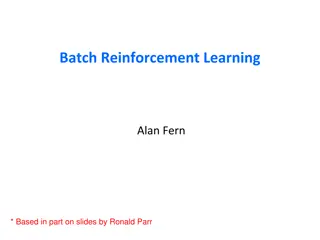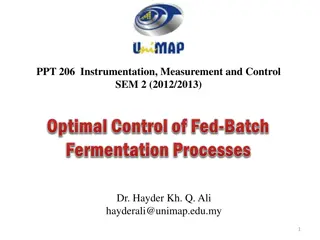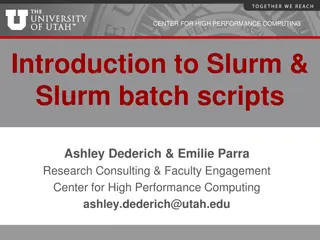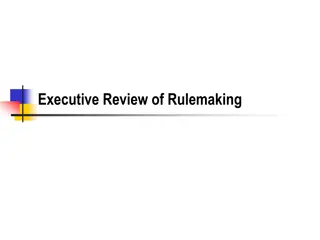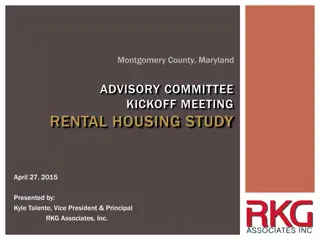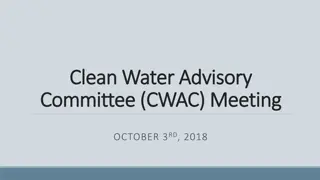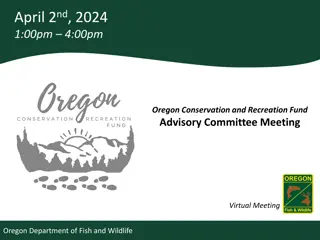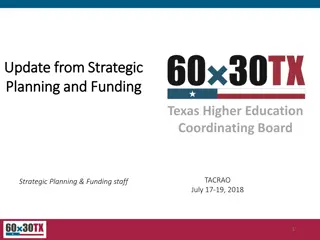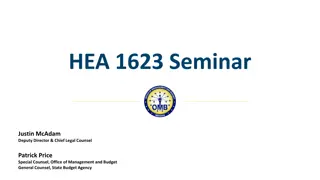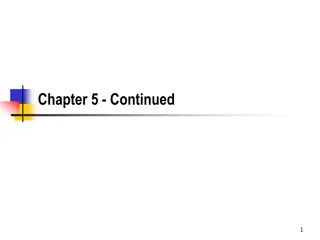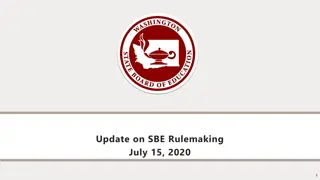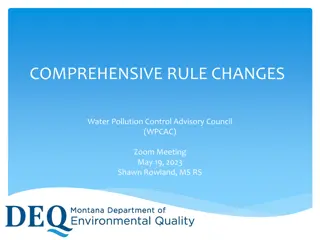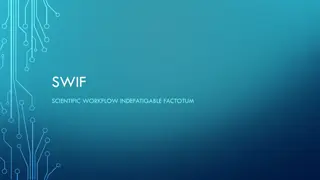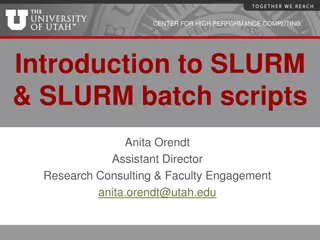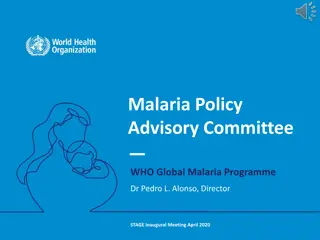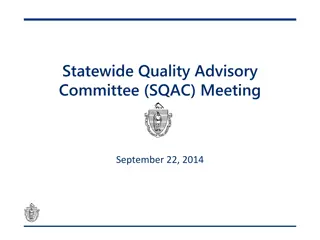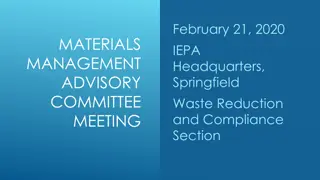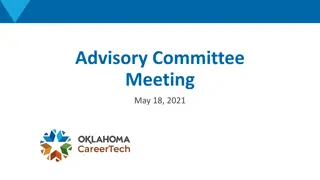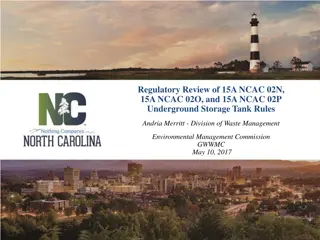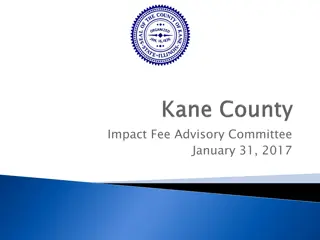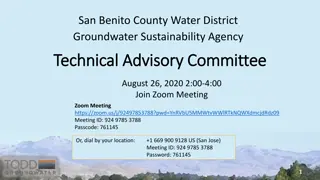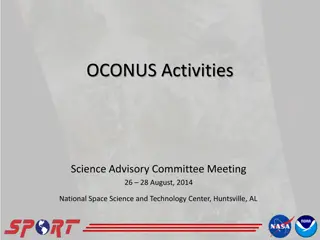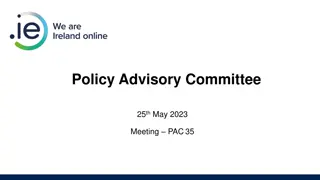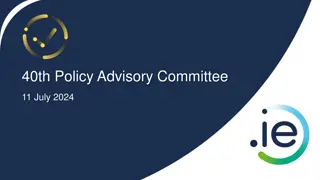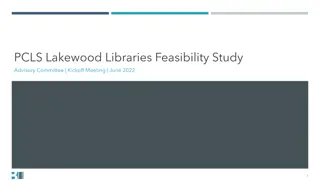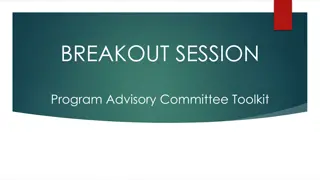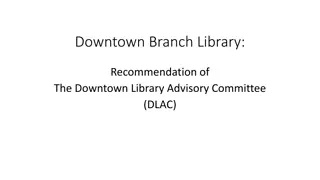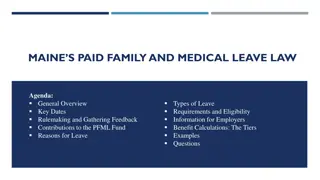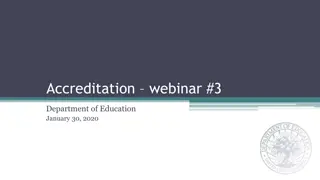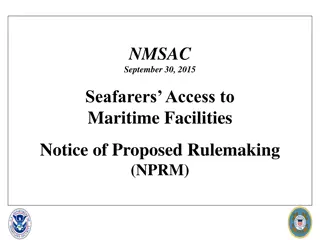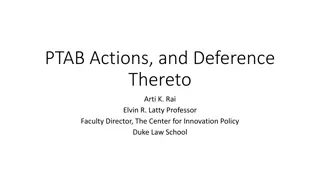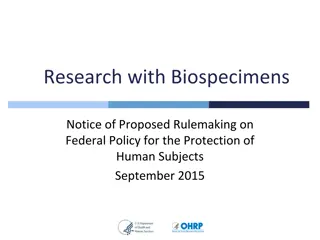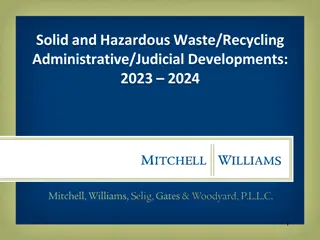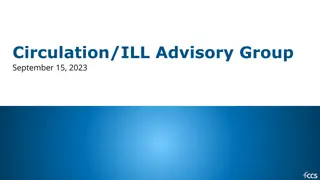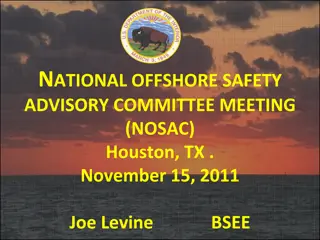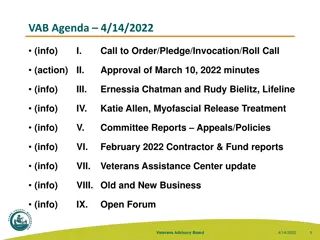PFMLI Rulemaking Advisory Committee - Batch 2 Draft Rules Review Meeting
The PFMLI Rulemaking Advisory Committee is holding a meeting on December 7, 2021, to receive input on Batch 2 draft administrative rules and fiscal impact statements regarding Paid Family and Medical Leave Insurance (PFMLI). The meeting aims to gather feedback before formal rulemaking with the Secretary of State. Stakeholders representing both employees and employers will discuss proposed rules, timeline, and batch descriptions. Attendees can participate in the chat or Q&A sections or submit questions/comments via email.
Download Presentation

Please find below an Image/Link to download the presentation.
The content on the website is provided AS IS for your information and personal use only. It may not be sold, licensed, or shared on other websites without obtaining consent from the author. Download presentation by click this link. If you encounter any issues during the download, it is possible that the publisher has removed the file from their server.
E N D
Presentation Transcript
Paid Family and Medical Leave Insurance (PFMLI) Rulemaking Advisory Committee December 7, 2021 9 AM to 11:30 AM Anne Friend, OED Rules Coordinator Shannon Ball, PFMLI Operations and Policy Lead
Welcome! Purpose of today: Agency to receive input on PFMLI s Batch 2 draft administrative rules and fiscal impact statements before beginning the formal rulemaking process with SOS. Please use the chat section for access and technical issues. If time allows, we will hear public comments at the end of the meeting. Please put your PFMLI questions/comments in the Q & A section. Please indicate in the Q & A section if you want to speak at the end of the meeting. Comments will be received in the order that attendees add their name to the Q & A section. Or, email your questions/comments to: OED_Rules@employ.Oregon.gov No UI or PUA benefit questions addressed today. This meeting is being recorded and will be retained as part of the rulemaking record. Support Business Promote Employment 2
PFMLI Rulemaking Advisory Committee Representing Employees: Linda Herrera, Pineros y Campesinos Unidos del Noroeste (PCUN) Andrea Paluso, Family Forward Oregon Eva Rippeteau, Oregon American Federation of State, County and Municipal Employees (AFSCME) Jessica Giannettino Villatoro, Oregon American Federation of Labor and Congress of Industrial Organizations (AFL-CIO) Representing Employers: Amanda Dalton, Dalton Advocacy, Inc. Jenny Dresler, Public Affairs Counsel Chantay Reid for Eric Hunter, CareOregon Paloma Sparks, Oregon Business & Industry Support Business Promote Employment 3
Proposed PFMLI Administrative Rules Tentative Timeline Batch Description Contributions Self-employed Election (application, requirements, and termination) Employer Size, Assistance Grants Outreach rule 1 January 2022 2 Equivalent Plans April 2022 Benefits Self-employed (benefits) Tribal Governments (application, requirements, benefits) 3 July 2022 4 Appeals August 2022 Miscellaneous: any addition rules identified Definition rules (consolidate, as needed) 5 September 2022 Support Business Promote Employment Provide Impartial, Fair and Efficient Contested Case Hearing Services 4
Batch 2 Rule Notices 2.1 Wages: Definitions 2.2 Equivalent Plans Support Business Promote Employment 5
2.1 Wages: Definitions Wages Definitions Support Business Promote Employment 6
Agricultural Labor - Comparison Unemployment Insurance ORS 657.045 (3) through (6) Paid Family and Medical Leave Insurance OAR 471-070-0400 (a) Except as provided in subsection (b) of this rule, agricultural labor means service on a farm in connection with the production, raising, or harvesting of any agricultural or horticultural commodity, includes farming in all its branches, and among other things, also includes: (A) Cultivating and tillage of the soil; (B) Dairying; (C) Raising, shearing, feeding, caring for, training, and management of livestock, bees, fur-bearing animals, wildlife, and poultry; and (D) Practices performed by a farmer or on a farm as an incident to or in conjunction with such farming operations, including preparation for market, delivery to storage or to market, or to carriers for transportation to market. (b) Agriculturallabor does not include, among other things, processing services that transform an agricultural commodity from its raw or natural state and services performed with respect to an agricultural product after it has been transformed from its raw or natural state. (3) Agricultural labor does not include services performed for the state or a political subdivision but does include all services performed: (a) On a farm, in the employ of any person, in connection with cultivating the soil, or in connection with raising or harvesting any agricultural or horticultural commodity, including the raising, shearing, feeding, caring for, training and management of livestock, bees, poultry and fur-bearing animals and wildlife. (b) In the employ of the owner or tenant or other operator of a farm, in connection with the operation, management, conservation, improvement or maintenance of such farm and its tools and equipment, or in salvaging timber or clearing land of brush and other debris left by a hurricane, if the major part of such services is performed on a farm. Support Business Promote Employment 7
Agricultural Labor Comparison Cont. Unemployment Insurance ORS 657.045 (3) through (6) Paid Family and Medical Leave Insurance OAR 471-070-0400 c) In connection with the production or harvesting of any commodity defined as an agricultural commodity in section 15(g) of the Federal Agricultural Marketing Act , as amended, or in connection with the ginning of cotton, or in connection with the operation or maintenance of ditches, canals, reservoirs or waterways not owned or operated for profit used exclusively for supplying and storing water for farming purposes. In the employ of the operator or group of operators of a farm or farms (or a cooperative organization of which such operator or operators are members) in handling, planting, drying, packing, packaging, processing, freezing, grading, storing or delivering to storage or to market or to a carrier for transportation to market, in its unmanufactured state, any agricultural or horticultural commodity, but only if such operator or group of operators produced more than one-half of the commodity, as measured by volume, weight or other customary means, with respect to which such service is performed. (a) Except as provided in subsection (b) of this rule, agricultural labor means service on a farm in connection with the production, raising, or harvesting of any agricultural or horticultural commodity, includes farming in all its branches, and among other things, also includes: (A) Cultivating and tillage of the soil; (B) Dairying; (C) Raising, shearing, feeding, caring for, training, and management of livestock, bees, fur-bearing animals, wildlife, and poultry; and (D) Practices performed by a farmer or on a farm as an incident to or in conjunction with such farming operations, including preparation for market, delivery to storage or to market, or to carriers for transportation to market. (b) Agriculturallabor does not include, among other things, processing services that transform an agricultural commodity from its raw or natural state and services performed with respect to an agricultural product after it has been transformed from its raw or natural state. d) Support Business Promote Employment 8
Agricultural Labor Comparison Cont. Unemployment Insurance ORS 657.045 (3) through (6) Paid Family and Medical Leave Insurance OAR 471-070-0400 (a) Except as provided in subsection (b) of this rule, agricultural labor means service on a farm in connection with the production, raising, or harvesting of any agricultural or horticultural commodity, includes farming in all its branches, and among other things, also includes: (A) Cultivating and tillage of the soil; (B) Dairying; (C) Raising, shearing, feeding, caring for, training, and management of livestock, bees, fur-bearing animals, wildlife, and poultry; and (D) Practices performed by a farmer or on a farm as an incident to or in conjunction with such farming operations, including preparation for market, delivery to storage or to market, or to carriers for transportation to market. (b) Agriculturallabor does not include, among other things, processing services that transform an agricultural commodity from its raw or natural state and services performed with respect to an agricultural product after it has been transformed from its raw or natural state. (4) Subsection (3)(d) of this section does not apply to service performed in connection with: (a) Commercial canning, commercial freezing or brining of cherries; (b) Any agricultural or horticultural commodity after its delivery to a terminal market for distribution for consumption; or (c) Any activity enumerated in subsection (3)(d) of this section when performed for an employer also engaged in any activity enumerated in paragraph (a) or (b) of this subsection. Support Business Promote Employment 9
Agricultural Labor Comparison Cont. Unemployment Insurance ORS 657.045 (3) through (6) Paid Family and Medical Leave Insurance OAR 471-070-0400 (a) Except as provided in subsection (b) of this rule, agricultural labor means service on a farm in connection with the production, raising, or harvesting of any agricultural or horticultural commodity, includes farming in all its branches, and among other things, also includes: (A) Cultivating and tillage of the soil; (B) Dairying; (C) Raising, shearing, feeding, caring for, training, and management of livestock, bees, fur-bearing animals, wildlife, and poultry; and (D) Practices performed by a farmer or on a farm as an incident to or in conjunction with such farming operations, including preparation for market, delivery to storage or to market, or to carriers for transportation to market. (b) Agriculturallabor does not include, among other things, processing services that transform an agricultural commodity from its raw or natural state and services performed with respect to an agricultural product after it has been transformed from its raw or natural state. (5) Farms, as used in this section, includes stock, dairy, poultry, fruit, fur-bearing animal, Christmas tree and truck farms, plantations, orchards, ranches, nurseries, ranges, greenhouses or other similar structures used primarily for the raising of agricultural or horticultural commodities. (6) For the purpose of this section, service in connection with the raising of forestry-type seedlings is agricultural labor when performed in a nursery. Support Business Promote Employment 10
Wages Definition: Statement of Need Racial Equity Impact Fiscal and Economic Impact Small Business Impact Support Business Promote Employment 11
2.2 Equivalent Plans Definitions Application Requirements and Effective Date Plan Requirements Reporting Requirements Recordkeeping and Department Review Solvency Documentation, Deposit, Bond, or Letter of Credit Disputes between an Equivalent Plan Employer and Employee, Request for Hearing Termination by the Department Termination by Successor in Interest Employer Withdrawal Support Business Promote Employment 12
Equivalent Plan Fee Structure Reapproval (annually for first three years) with substantive changes, including switching insurance policies, changing from fully insured to employer administered or vice versa. $250 Reapproval (annually for first three years) with no changes at all $150 Reapproval (annually for first three years) with nonsubstantive changes $150 Substantive change in between required annual reapprovals or after three year reapproval process is complete $250 Nonsubstantive changes in between annual reapprovals or after the three year reapproval process is complete No charge Support Business Promote Employment 13
Equivalent Plan Fee Structure Nonsubstantive changes can be made at any time without a fee. Changes that are nonsubstantive include, but are not limited to: Business Identification Number Business name Business address Name and contact information of the business s contact person Telephone and email changes Typographical errors in any of these fields Typographical errors in the copy of the equivalent plan or attestation Grammatical errors Changes in statutory reference Any statutorily required amendment Support Business Promote Employment 14
Equivalent Plans: Statement of Need Racial Equity Impact Fiscal and Economic Impact Small Business Impact Support Business Promote Employment 15
Public Comments Please use the chat section for access and technical issues. Please put your PFMLI questions/comments in the Q & A section. If you would like to speak, please indicate in the Q & A section that you would like to speak. Comments will be received in the order that attendees add their name to the Q & A section. Please indicated which rule or group of rules in Batch 2 you would like to comment on today. If you would like to provide comments on Batch 1 rules, please email your questions/comments to: OED_Rules@employ.Oregon.gov Support Business Promote Employment 16
PFMLI Formal Rulemaking Batch 2 Notice of Public Rulemaking: Published in the Oregon Bulletin: February 1, 2022 Batch 2 Public Hearings: February 23, 2022 (3-5 pm) and February 28, 2022 (9-11 am) Also, don t forget about these important dates for PFMLI Batch 1 rules: Batch 1 Public Hearing: December 9, 2021 (4-6 pm) Batch 1 Public Comment Period Closes: December 20, 2021 (5 pm) Support Business Promote Employment 17
PFMLI Formal Rulemaking OED Rules webpage is the official formal rulemaking page: www.oregon.gov/employ/Agency/Pages/OED%20Administrative%20Rules.aspx PFMLI webpage: www.oregon.gov/employ/PFMLI/Pages/default.aspx Email your questions/comments to: OED_Rules@employ.Oregon.gov Support Business Promote Employment 18
Thank you Support Business Promote Employment 19
